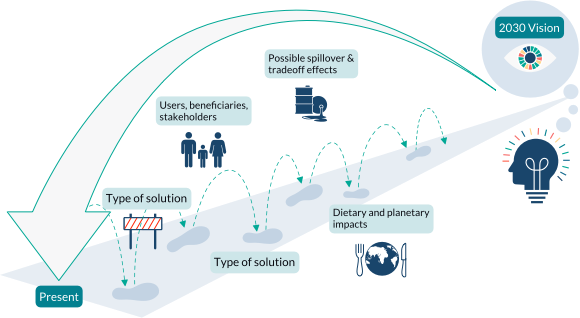Sharing economy

Description of the innovative solution
Although an exact definition is contested, the sharing economy generally refers to models of sharing access and/or ownership of resources, goods and services, whether with or without a monetary exchange. Broader definitions may include acts of reselling, swapping, gifting, renting and lending as well,. This phenomenon exists across many sectors, and has been especially helped by digital mediation (e.g. online platforms such as Wikipedia or AirBnb). In agriculture, common forms of the sharing economy include community gardens, food swapping, and alternative food networks (AFNs), such as...
Although an exact definition is contested, the sharing economy generally refers to models of sharing access and/or ownership of resources, goods and services, whether with or without a monetary exchange. Broader definitions may include acts of reselling, swapping, gifting, renting and lending as well,. This phenomenon exists across many sectors, and has been especially helped by digital mediation (e.g. online platforms such as Wikipedia or AirBnb). In agriculture, common forms of the sharing economy include community gardens, food swapping, and alternative food networks (AFNs), such as community supported agriculture (CSAs) or solidarity purchasing groups (SPGs). Sharing in agri-food systems can occur both on the production and the consumption end. For instance, farmers can share equipment used for production, or they can share the labor and harvest from a community garden. In addition, different forms of capital, whether human, social, natural, built, or otherwise, can be shared. While many sharing economy networks rely on trust and informal governance structures/rules, others make more use of bureaucratic elements. Supporters of the sharing economy claim it can reduce the risk that individuals take on, allow for scaling and reduce barriers to access, increase sustainability and productivity and decrease unnecessary consumption, and lead to more resilient communities. Some critics claim that benefits aren't guaranteed, and are dependent upon the motivations and methods associated with the initiative, and point to cooptation of these initiatives by corporate interests. Others claim that such a shift to sharing can lead to an unregulated market and unfair competition. Given the heterogeneity of sharing economy initiatives, it is important that they are criticized or applauded relative to the goals and context of each project.
Examples and additional resources
Real-world examples
See this solution in action in different contexts and settings around the world
Alternative food networks in Valencia
Alternative Food Networks in China
Additional resources
Learn more about this solution through studies, articles, business cases, and other information
The sharing economy: make it sustainable
Contacts
Connect to others working on and with this solution around the world
Pathways to uptake
Engage with our “backcasting tool” to imagine and design “pathways to uptake” for this solution in your setting.
This process involves defining a future vision of this solution being used in your context, and then working “backwards” to identify necessary steps to achieve this vision by 2030. Going through this exercise as an individual or with a team can help to clarify the WHAT/WHEN/HOW of moving a solution (or package of solutions) towards having major impact. We hope these pathways will inspire outside-of-the-box thinking, creative approaches, and actionable concrete steps to move ideas into action.
Pathway builder
Explore pathways for this solution
Be the first one and add a pathway for this solution!